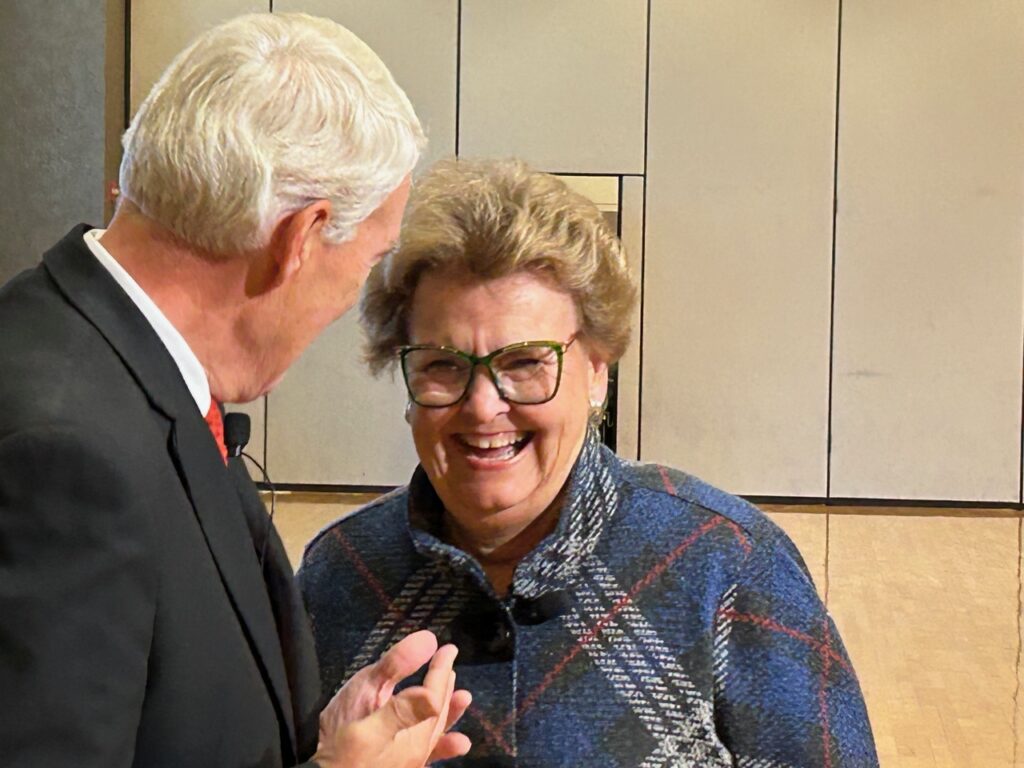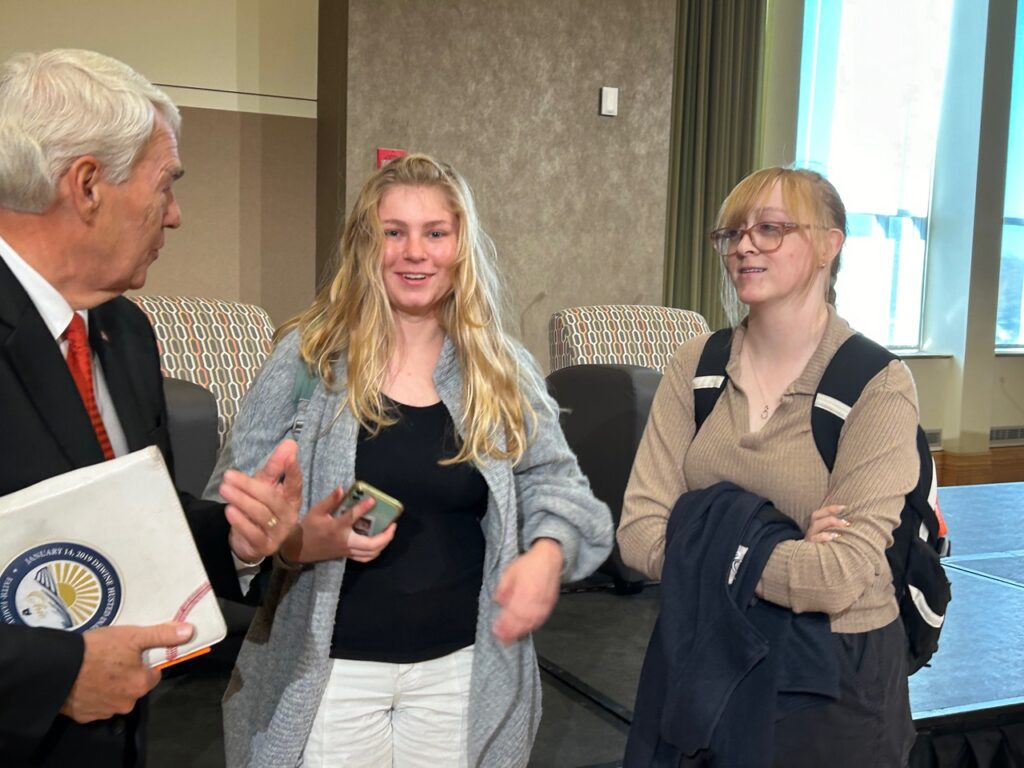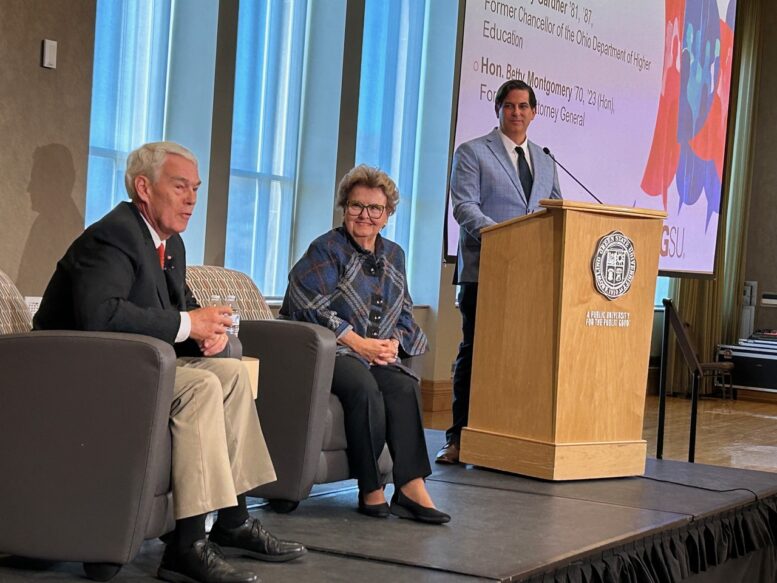By DAVID DUPONT
BG Independent News
This was the question Randy Gardner and Betty Montgomery, with close to 90 years of public service between them, dreaded being asked in their public conversation recently at BGSU.
Just two days after the Presidential election, Montgomery, former Ohio Attorney General, and Gardner, former Ohio Chancellor of Higher Education, met on stage as part of the university’s Day of Dialogue to discuss their careers with Robert Alexander, a member of the university’s Political Science Department.
Alexander, who was hired last spring, founded the Democracy and Public Policy Research Network here. He called Montgomery and Gardner legends in Ohio politics.

The question these legends didn’t care to answer was: What do you dread?
While neither said they dreaded anything, they both have serious concerns about the way people engage with politics.
“I’m disappointed in the public discourse and dialogue,” Gardner said. “It’s shallow. I think the internet and social media has driven us into ideological corners.”
“We have a whole generation growing up thinking the way you solve problem is to shout at each other,” Montgomery said.
While the internet and smart phones have benefits, people have not yet mastered how to use them, she said. People don’t know where to find the facts because what they see is determined by the analytics of the media companies.
“What you see and read is what someone wants you to see and read,” Gardner said.
“It’s not only what the facts are and what to believe,” he said, “Sometimes you’ve got to know it’s not true but if it serves your political purpose it’s OK.”
He recalled correcting someone on Facebook who was sharing a falsehood about one of President Obama’s children. If the poster looked into it that would find the story was not true, Gardner “respectfully” suggested.
The poster response was: “Does that mean you’re a supporter?”
He noted that a survey found that 30 percent of people “still think dogs and cats were consumed in Springfield. Everyone knows that’s not true. They should know it’s not true, but it still makes a point. It serves their political purpose.”
Montgomery lamented the decline of newspapers. She recalled a time when every Sunday morning a politician would open the editorial pages with trepidation because someone would take them to task for something they had done.
Now “you don’t have the newspapers to hold you to account,” she said. “That accountability is missing.”
Instead on social media “people have deputized themselves to tell us what the facts are,” she said. “The biggest danger to democracy is an uninformed, unengaged electorate.”
Montgomery said there’s a time when people have to set aside the technology, and instead of texting, get up and talk to someone face to face.
Gardner made a similar point when talking about how to accomplish policy across the aisle. In his 34 years in the State Legislature, serving twice in both chambers, he’s had to operate in a bipartisan way by asking a Democratic leader to get behind a bill or praising the budget bill put forward by Gov. Ted Strickland.
That’s meant opposing action favored by his fellow Republicans. Most notably, in 2011, as a senator he voted against Senate Bill 5, a controversial measure that would have severely limited public employees’ collective bargaining powers. While he agreed with many aspects of the bill, he said, “parts of it were to disadvantage or disrespect public employees” including teachers and faculty at the university. “I couldn’t live in Bowling Green, and have people think I didn’t respect them.”
As he predicted, the measure was soon thrown out by referendum with more than 60 percent of voter against the legislation.
But working across the aisle has gotten more difficult, though he was heartened by a panel earlier in the day during which Ohio House members, including Haraz Ghanbari, of Perrysburg, discussed bipartisanship.
While both Montgomery and Gardner were concerned about social media, including the threats posed by artificial intelligence, both are also optimistic about today’s college students.
Montgomery recalled her time on the BGSU Board of Trustees, including serving as chair during the pandemic. She was impressed by what students were accomplishing. “These students come and do so many remarkable things. We are giving them a platform and giving them the tools to realize their potential.”
She continued: “Our higher education and our primary education are really critical to let our students realize who they are and what they can be. … I have faith in our youth. We have to educate them, and they have to work to be educated. They have great potential.”

Gardner said he’s been impressed with the students he’s worked with at the university through the new center.
He noted that the legislature has funded five democracy centers at campuses around the state. BGSU was not one of them.
BGSU did it without state funding, he said. “My expectation is we’re going to continue to have more and more people, faculty, students and community, engaged in what we’re doing and showing how, in a balanced way, we can heighten the public discourse,” he said. “I’m hopeful and excited. We’re going to continue to make progress. … And show Ohio how it’s done.”
Then as if on cue, Montgomery said “because we’re a public university for the public good.”

